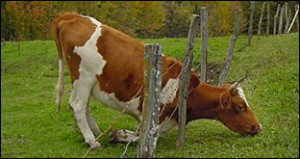The Reality of Anxiety and Depression
There we were, four adult friends gathered together in a bar, looking perfectly put together on the outside, talking about the anxiety and depression that run deep through our families into each of our hearts. While we are all very functional in our demanding professional roles, we carry a dysfunction in our minds. We have chemistry, a pattern, a wiring of debilitating thoughts.
We are, of course, not alone. As Scott Stossel, editor of the well-regarded The Atlantic magazine points out in his book, My Age of Anxiety, “Many of history’s famous leaders lived with the demons of anxiety and depression.”
When you say it, it sounds clinical. When you experience it, it feels profoundly dark, heavy, empty and depleting.
It pretty much feels like this:

On a recent work trip to Boston, I asked the taxi driver from the airport to drop me off in Fort Point Channel where I used to work during a time when my anxiety was most severe. Pulling my luggage over cobblestone sidewalks, past the giant milk bottle across from the Children’s Museum, I arrived at the John Joseph Moakley Courthouse. The sidewalk here bends around to the back of the courthouse from a chaotic, urban landscape into a calm oasis.
Here’s a view from the back of the courthouse:

I wrapped up a phone call and then stood in silence, paying homage to this space where I used to go nearly every day during work.
Years ago, I could only function at work for about three hours before I was utterly drained of energy. If you haven’t experienced this, just imagine all of your physical, mental and emotional capacity leaking out of you—like trying to take a bath with an open drain. So it was to this place I would go to recharge in the middle of a busy workday, to walk slowly along the ledge, stare out into the water and lay down in the grass.
It makes me sad but also grateful to think about that time.
Anxiety and depression are strange in that I don’t think anyone I worked with at the time knew about this darkness in me. It was a well-hidden secret. A secret that made me feel ashamed, confused and weak.
You might face these same demons. You definitely know people who do. Roughly one out of five people faces this battle at any given time.
Here’s what I learned from my big battle years ago, and the smaller battles that I and others continue to fight every day:
- When someone else is struggling, just be caring, not fixing. When your colleague talks about her anxiety or her son’s depression, or your wife says she’s fighting this battle, simply show concern. Avoid saying things like, You should read this book, or Here’s what my friend did to snap out of it, or Have you tried medication?
Instead, try phrases like:
I’m really sad for you.
That’s really hard.
I’m sorry.Follow up later with comments like:
I’ve been praying for your endurance.
Want to go for a walk? - When you’re struggling, let people help. The hard parts about asking for help when you need it most are that 1) you don’t have the energy or clarity to seek help and 2) you tend to shame yourself into thinking you should be able to get yourself out of the mess. This is one reason why the first step of AA is to admit we are powerless over our condition. Doctors and counselors have very effective therapies. Friends and family have hearts and hands to help carry your load.
- Put one foot in front of the other. This was one of the encouragements from my wife, inspired by her mother, when I was at one of my lowest points. I’m pretty convinced after fighting these battles for nearly my entire life that paralysis is the enemy of progress and movement is the catalyst for improvement.
All of the inertia of anxiety and depression is toward hiding, resigning and stopping. Yet it’s only by walking that we get from the chaos around the building to the oasis.
What’s been your connection to anxiety and depression?









Wow! At once authentic and inspiring. I too have walked the road of anxiety and hiding. Early in my life as a parent I nearly came apart at the emotional seams. Not just a little tantrum, but an all out raging fit. Only my choice to get out of the house before I blew kept it from boiling over and burning my wife and kids. As part of the “let people help” advice above, I sought professional help because the well-intended help of people who cared was a little more on the “fix-it” side than I found helpful and seemed to make matters worse. For what it’s worth – the choice to let professionals help may well have been the wisest choice I’ve ever made. I can’t imagine what prices I would have paid (monetary AND relational) over the years. So if any of those reading feel torn about whether to get this kind of help, I say, go for it!
Jim, thank you for your personal testimonial to the power of professional help. It’s ironic, isn’t it, that we’d obviously go to a doctor to treat a broken leg but we’d hesitate to go to a professional for a broken spirit.
Thank you Matt Norman, for stepping out and being vulnerable. I too can share a story of my dance with anxiety. I was diagnosed by my Standard Poodle- Jack. 9 years ago I took Jack to the Vet because he was throwing up in the house. This frustrated me and I was sure he was really sick. He passed all his tests and the Vet looked at me and said, “Jack is healthy. How are you doing?” At that point, I had a flood of tears. My life was like the saying, “When it rains it pours.” I realized I had to start taking care of myself and dive back into my old hobbies. Thankful for my “guard dog”, who ended up internalizing my stress and communicating to me to ask for help with all the trials that had heaped on my life. I have tremendous compassion for people with tribulations. Showing we care for people in turmoil is a noble gesture. I look back at that chapter of my life with gratitude. It is actually the healthy, strong people that admit weakness and ask for help! The weak are into blaming, shaming and guilt. This keeps them at a stand still.
Stacey – what an incredible story of how those around us, even our pets, absorb our psychological issues. Thank you for your insights and vulnerability.